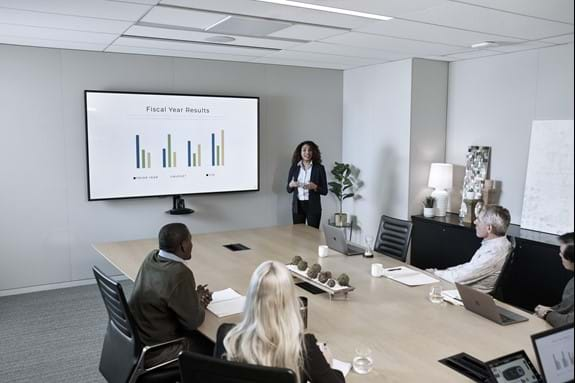Organizations of all types are relying more than ever on videoconferencing and collaboration applications to link their employees. However, recent research indicates that most meeting room audio set-ups deliver an inconsistent experience that varies by team, room size, and intended use. Equipment limitations in meeting rooms are a huge source of irritation to office workers, and are creating some key obstacles that are getting in the way of successful hybrid meetings:
- Difficult interaction between remote and onsite attendees
- Lack of natural discussion flow
- Reduced attention span
All of these are closely linked to poor audio quality and inhibit collaboration. Worse yet, the effects are not evenly distributed. In some scenarios it is remote workers who have the most difficulty participating in meetings; in others it is the in-office workers who suffer. Either way, the lack of equity in meeting participation detracts from workplace efficiency and team productivity.
When we dig deeper, we get to some of the technical problems that are the root causes:
- Excessive pickup of room noise that obscures speech
- Uneven audio coverage that doesn’t capture all seating areas
- Variations in talker levels; some people are loud, some are too soft
- Remote participants are difficult to hear
- Room noise or echo is disruptive
Poor audio is the unseen meeting productivity killer. It inhibits interaction at a time when organizations are working hard to engineer a return to the office and “bring back the magic” of workplace dynamics and company culture.
But the good news is that the impact of audio improvements can be dramatic. Upgrading from outdated or inferior microphones, loudspeakers, and digital signal processing can relieve the aggravation, wasted time, and reduced engagement overnight.
Audio technology has evolved rapidly in the last few years, both in terms of increased raw performance and a decrease in complexity and installation time. The ongoing integration of more powerful features and capabilities into both audio hardware and software means you get more transformative results with less effort. In other words, a relatively small investment – of both time and money -- can have a massive impact on how well meeting rooms support users.
For example, in training rooms it can be difficult for remote participants to hear questions and comments posed by in-room attendees or a presenter moving around at the front of the room. The MXA920 Ceiling Array Microphone allows you to define up to eight distinct coverage areas to pick up the entire seating area plus a wall of whiteboards, so every word is clear and intelligible.
When the superior performance of outboard audio DSP is desired, a software-based option like IntelliMixTM Room delivers exceptional results while eliminating cumbersome hardware, because it runs on the same room PC as the collaboration application. This speeds setup and greatly simplifies the installation process for the shortest pathway to room availability.

MXA920 Ceiling Array Microphone
Certification with popular collaboration tools like Microsoft Teams and Zoom ensure that the audio system has been thoroughly tested to perform reliably under all meeting conditions. There’s no need for time-consuming testing and tweaking in the hope that everything will work together.
The bottom line? Achieving greater collaboration and productivity requires changing the way people – employees, partners, and customers – work, interact, and make decisions. Studies point to the fact that audio is a critical component of how these interactions happen across hybrid and global organizations. Even relatively small investments in audio can result in greater engagement and a more collaborative culture that enables faster decision-making.
To read more information and insights on how improved meeting and conferencing audio solutions can help address meeting room challenges and make the collaboration journey pleasurable and fruitful for everyone, then read the IDC Vendor Spotlight.
Source: IDC Vendor Spotlight, sponsored by Shure, SOUND ADVICE: MAXIMIZING HYBRID WORK THROUGH AUDIO QUALITY, Doc #EUR150423123, March 2023


Related Posts
Part 2: Sound of Satisfaction: How High-Quality Audio Enhances Employee Experience
Unleash employee satisfaction with high-quality audio. Enhance productivity, engagement, and workplace happiness through superior sound technology.
Circle of Frustration Video
Optimize productivity and morale by investing in quality audio solutions, enhancing communication, and breaking frustration cycles for both in-office and remote teams.